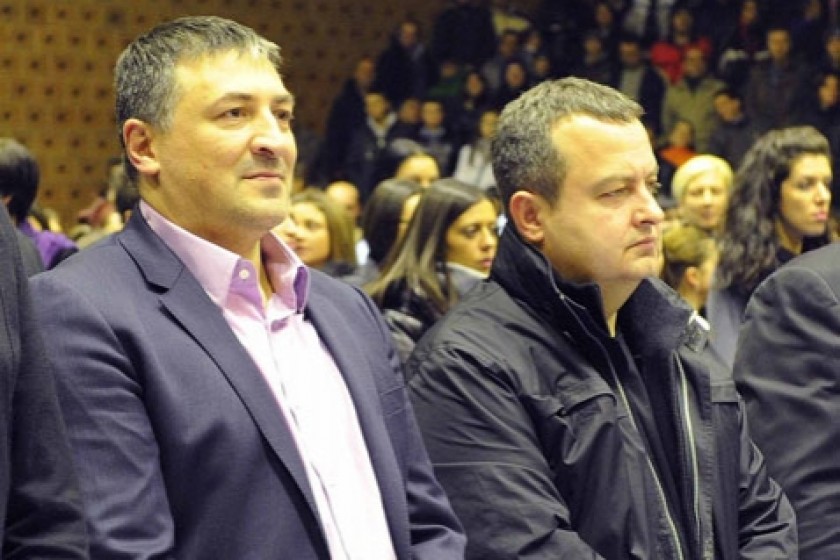
Advisor To Serbian Prime Minister Worked For Montenegrin Criminal
By Stevan Dojčinović, Bojana Jovanović, Mahir Šahinović, and Christoph Zotter
Soon after Ivica Tončev, a low profile businessman turned politician, moved from Austria to Serbia about five years ago, he quickly established himself as one of the more influential people in the country. Today he is an advisor for national security to the Prime Minister and Interior Minister Ivica Dačić, President of the Socialist Party of Serbia (SPS).
But that doesn’t really reflect Tončev’s true power. Tončev is on the board which manages the finances of SPS – usually one of the most sensitive positions in Serbian politics. The position is often reserved for important insiders who can effectively manage the murky world of party financing.
Before resigning recently, he was also a member of the Parliament of Serbia and of two parliamentary committees: the Committee on the Diaspora and Serbs in the Region and the Committee on the Economy, Regional Development, Trade, Tourism and Energy. The anticorruption agency asked him to resign from either parliament or from the advisor position because holding two positions in different branches of government represented a conflict of interest. He chose to resign from parliament.
He was recently named to the prestigious post of a vice president of the once proud Red Star Belgrade football club, a state owned club that is near bankruptcy after years of being a being plundered by political and mafia interests.
But while Tončev is now an important and connected member of Serbia’s political elite, in his private life he has also been connected to important people. Tončev has been in long-time business relations with an influential organized crime figure.
According to research of the Organized Crime and Corruption Reporting Project (OCCRP) and the Center for Investigative Journalism in Serbia (CINS), Tončev managed a company owned by Branislav Šaranović, a secretive but influentialcrime figure from Montenegro who was assassinated in Belgrade in 2009. Tončev sold his Vienna based company Tončev GmbH to Šaranović in 2006 and then continued to serve as manager of Šaranović’s company. Even after Šaranović was assassinated, Tončev continued to manage the company's Representative Office in Belgrade and officially does so today.
The connection raises serious questions about the influence of organized crime in Serbian politics. Previous OCCRP/CINS stories showed that SPS’s headquarters building was the site of a night club that the Šarić brothers had an interest in.
Vienna connection
Details of the Tončev business in Austria before he came to Belgrade have never before been known to the public. While Tončev cultivates the image of a successful businessman, it is not clear where he got his money, his education and other basic information usually well known for such a powerful person.
What is known is that in September of 2003 in Vienna, Tončev signed a contract for establishing the firm I.S.K. Immobilien-Bau-Handels GmbH. His partner was
Skender Januzi, an ethnic Albanian businessman, according to documents filed in the archives of the Austrian business registry. Together they invested €35,000 and appointed Januzi's wife Edith as manager.
The Januzi’s also own the firm Januzi GmbH, a real estate and property development firm according to their website. OCCRP could find little else about this family.
Skender Januzi confirmed for CINS and OCCRP that he established company with Tončev and that they are good friends. “I know him over twenty years. Then we started the company.”
Januzi declined to answer questions about their joint venture, but he had only words of praise about Tončev.
“He was a very fair man. When he make a promise, he keeps that word. I worked with him and he proved as fair and good businessman. I am an Albanian, he is a Serb, but it didn't make a problem. I'm happy that I spent such a nice time with him.”
Vienna, the capital of Austria, has historically been a major destination country for Yugoslavian immigrants in Europe. Immigrants from the region have been going to Austria for decades in search of work. This wave intensified during the Balkan wars of the 90s. Some estimates say there more than 120,000 Serbian immigrants live in Vienna alone.
But the cooperation between Tončev and Januzi did not last long. The Januzi’s left the company in January 2004, less than four months after it was founded.
“We wanted to work on a big construction project, but we didn’t get the job and we (Januzi and his wife) didn't want to be in that company,” Januzi said.
 Videos
Videos Photos
Photos
Write a comment